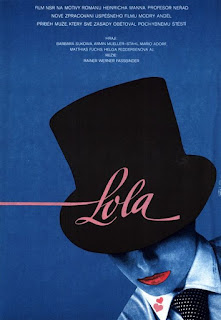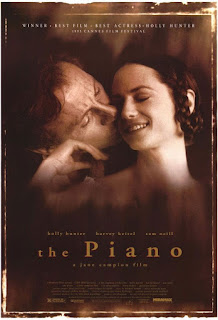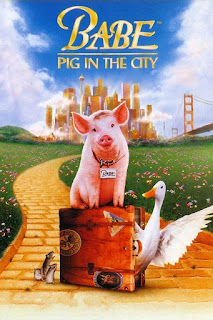March 28th: LOLA (Rainer Werner Fassbinder, 1981)
Rainer Werner Fassbinder was the enfant terrible of post-war German cinema, and a key member of the New German Cinema movement beginning in the 1960s that also featured Werner Herzog and Wim Wenders. He began writing stories, poems and plays as a teenager, and began his theatre career as an actor, while making 8mm films on the side. Unable to get into the Berlin Film School, he dove deeper into theatre and formed his own experimental company where he served in various capacities. This stock company would provide a ready-made roster of actors and technicians when he branched out into feature filmmaking in 1969.
As the 1970s drew to a close, Fassbinder became interested in analyzing what he saw as Germany's historic amnesia about its role in World War II, as well as effect of the series of reforms in 1948 that came to be known as the "economic miracle" and revitalized West Germany. His 1979 film reflecting on the subject, The Marriage of Maria Braun, was a major international breakthrough, and at the suggestion of an actor friend was set to follow it up with an ostensible remake of Josef von Sternberg's 1930 collaboration with Marlene Dietrich, The Blue Angel.
Fassbinder's regular writing partner Peter Märthesheimer first returned to The Blue Angel's original 1905 source novel, but quickly lost interest, and soon the director agreed that the story would be more interesting if repurposed for the 1950s period he was already exploring. Eventually the script became a distinct entity, and the producer settled with the writer's estate out of court to use it as inspiration.
Having made a habit of paying homage to Hollywood director (and German emigre) Douglas Sirk, known for his melodramas suffused with bold Technicolor (All That Heaven Allows, Written On The Wind, Imitation of Life), Fassbinder went full-throttle with the color palette, working with his recent cinematographer Xavier Schwarzenberger to infuse the film with gaudy, garish pastels, giving each character and their environs a specific color scheme.
The title character is played by Barbara Sukowa, who just finished working for Fassbinder on his 14-hour TV miniseries Berlin Alexanderplatz. Also starring is Armin Mueller-Stahl, a film, stage, and TV actor in communist East Germany, who was blacklisted by the government for political protests and recently relocated to West Germany. The third major role is played by Mario Adorf, featured in recent Oscar-winning German film The Tin Drum.
Fassbinder did not rewrite script before the film started shooting, but made major changes during the production, including its highly cynical ending, and creating a character for his former lover Günther Kauffman, who had appeared in several of the director's previous works. He added the title "BRD 3" to the film's credits, announcing it to be part of a trilogy about the Bundesrepublik Deutschland (West Germany's official name), with Maria Braun retroactively included as Part 1, and his next film Veronika Voss to fill in the gap.
Running time is approx. 2 hours.









